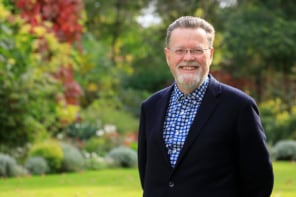Pruthvi Mehta says more support should be given to non‑native English-speaking scientists who can feel isolated and disadvantaged in what to them is an unfair system

English is the lingua franca of science. An estimated 98% of all scientific publications are written in English and the vast majority of talks at international and most local conferences are given in the language. To disseminate their results as widely as possible, students who are non-native English speakers must therefore not only learn their field of expertise but also what is in effect a new “dialect”. While English’s ascendency is widely accepted and unchallenged, the situation leads to a gatekeeping of scientific information. It is a way of doing science that is unfair and needs to be undone.
English’s dominance was not always the case. In 1880 only 36% of scientific publications were written in English, and centuries prior to this Arabic dominated medical, mathematical and astrophysical texts. The “Islamic golden age” was a time when the foundations of the scientific method were laid, when innovations and improvements to many works from Aristotelian physics were made.
Indeed, many vital texts in physics were first written in Arabic. These include al-Khāzini’s The Balance of Wisdom as well as al-Haytham’s Book of Optics (Kitāb al-Mānazir), which was the first text to postulate that light is reflected off different surfaces. This idea was in stark contrast to the prior Greek Euclidean and Ptolemaic theories that light rays were emitted from the eyes and back again. In fact, al-Khwārizmī’s The Compendious Book on Calculation by Completion and Balancing – influenced by the Indian text Āryabhatīya in 499 CE – was the first work to teach algebra and one of the most transformative and important works in the history of mathematics.
However, due to the colonial nature of the Western science curriculum that I encountered first at school and then as a physics undergraduate, I learnt plenty about the scientific virtues of Aristotelian physics but nothing about their non-Western counterparts. That’s a shame as the importance of teaching and translating the works of the Islamic golden age was somthing that European scientists of that era understood well.
Al-Khwārizmī’s books on algebra, for example, were used until the 16th century as the principal mathematical literature at European universities – a lot of mileage for texts that were written in 820 AD. The ability of science to be disseminated throughout all languages has been vital for its survival and continuation and was instrumental to the revival of learning science in the West. Academics at the time knew that science should be a multilingual enterprise.
Transformative work
It is unfair now to demand that scientists all over the world treat science as a monoglot exercise – something that should remain firmly within the constraints of the English language. Science is difficult enough without adding the need for non-native English speakers to be able to fluently present and publish only in English. How many talented non-English speaking students and academics feel as though their ability to survive in academia depends on their capacity to speak and write in a language that is not their own? How many scientists have non-English scientific works that have been ignored simply because they were not written in the “right” language? Why isn’t more being done to aid them?
Many scientists have already spoken out about the struggle of not having English as their mother tongue. In 2019 Adriana Romero-Olivares, who was then a biology postdoc at the University of New Hampshire, wrote in Science about the harsh, undeserved criticism that was given to her and her collaborators about the way their paper was written. She cited one reviewer who criticized her very first paper by saying that: “The authors need a native English-speaking co-author to thoroughly revise the grammar of this manuscript.”
Romero-Olivares says that her “heart sank” when she received such feedback, especially given that the reviewer did not say anything about the underlying science (Science 10.1126/science.caredit.aaz7179). There are many other similar accounts that indicate attitudes that contribute to the systematic bias in science – not overtly racist but an inbuilt injustice due to the centring and framing of the West as a global scientific powerhouse.
Hoping for a different dominant language or multiple languages seems unlikely to happen, at least in my lifetime. But publications and journals that are not written in English should be regarded as equally valuable as those that are, and efforts should be made to translate between all of them. At the very least, we need to make sure those in academia who are not fluent in English feel adequately supported. This could mean having translation services and language support built into grants for non-English speaking academics. Another is the inclusion of language-editing services such as that offered by IOP Publishing, which publishes Physics World. It could also mean ensuring that there is free, easy-to-access English-language training services for all who require it.
We need to do a lot of introspection. Every native English-speaking scientist – especially those who do not know another language – should try to understand how isolating it must be to carry out research and present and publish in a dialect that is not their own. We should not let a language hailing from a tiny island in north-western Europe determine the integrity of a discipline that is carried out globally. By doing so we are inhibiting the progress that scientists of the past tried so hard to protect.



